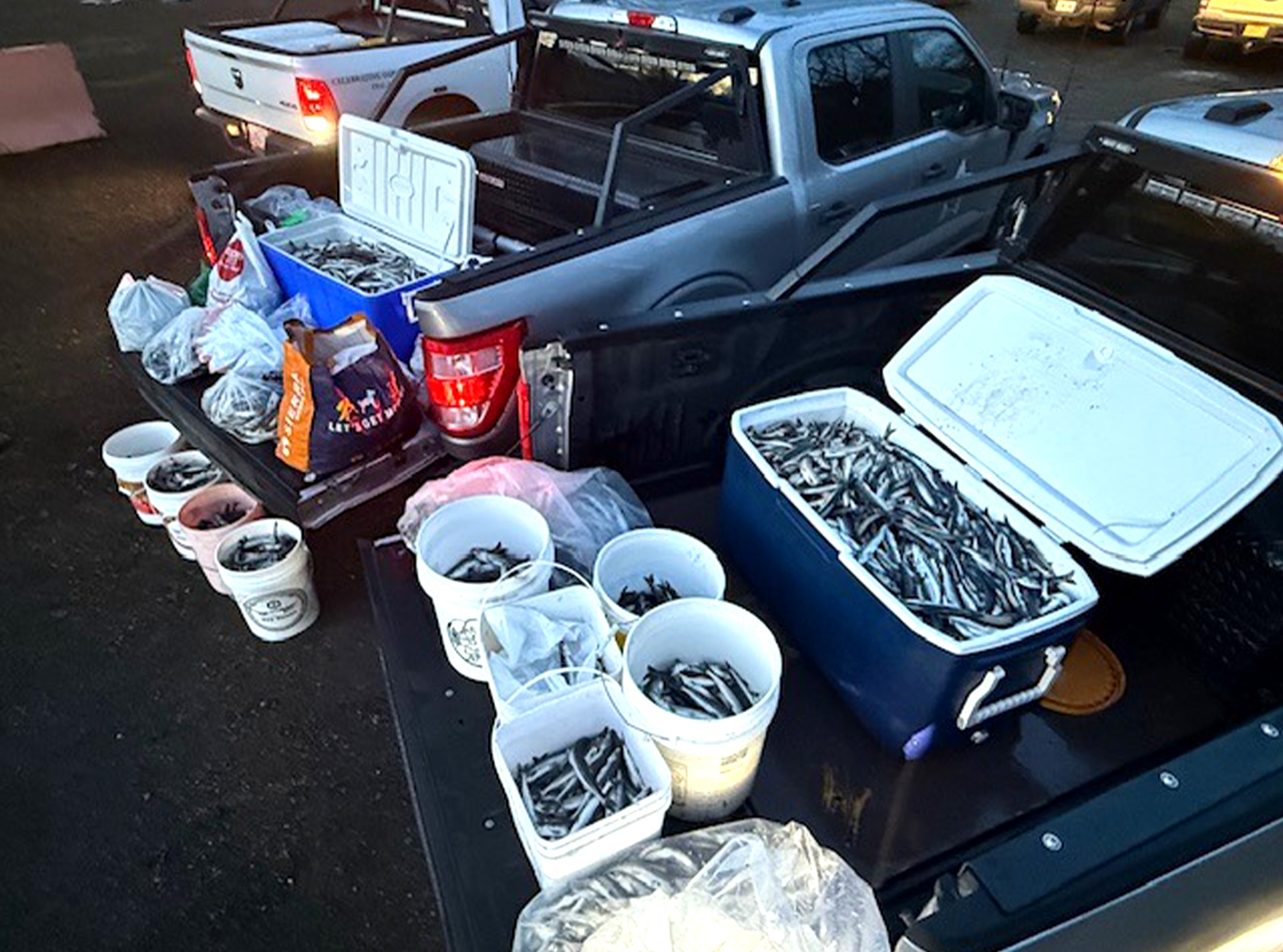Best Duck Decoys of 2024

We may earn revenue from the products available on this page and participate in affiliate programs. Learn More ›
All expert waterfowl hunters are good at the same four things: scouting, calling and decoying, hiding, and shooting. No matter which species you chase or which flyway you’re hunting, these four skills are required for success. Owning a spread of the best duck decoys that are perfectly suited to your hunting style certainly helps as well.
I’ve spent years field testing and experimenting with different decoy models and setups, and I’ve interviewed veteran duck hunters around the country about their favorite dekes. My wife would say I have a duck decoy collection problem, but I contend it’s only a problem if you’re trying to solve it, which I am not. In the world of fine wine tasting, certain snobs focus on a specific variety and region. Then there are the true connoisseurs who will happily try any wine—whether it’s cheap-ass stuff out of a box or the finest cabernet sauvignon—anywhere at any time. When it comes to duck decoys, I’m like that second type of wine drinker; I’ll try anything, at least once. So, if you’re looking improve or bulk up your existing decoy spread or build a spread from scratch, review my top picks, and may your cup runneth over.
Best Decoys
Best Motion Decoys
How I Picked the Best Duck Decoys
I picked decoys that I’ve hunted over through the years and have seen perform well in the field. I also relied on my colleagues and other veteran waterfowl hunters to recommend their favorite decoys. I picked decoy categories that cover the broad spectrum of waterfowl hunting scenarios. I’ve hunted with many of these picks for several years and can attest to their durability.
In all cases, I leaned toward decoys that look realistic in the field. That means the decoys tend to run on the more expensive side. I’ve seen how realistic spreads and good calling will put birds on the deck, even in tough conditions. I’ve also seen cheap decoys wear out after a single year. Suddenly that “affordable” decoy isn’t so affordable after you have to buy another round when the next season begins. In short, over the last several seasons I’ve hunted hard with a wide variety of decoys, evaluating their realism and durability.
Best Duck Decoys: Reviews and Recommendations
See It
Pros
- Highly durable construction
- Ultra-realistic carve
- Paint scheme creates the illusion of movement
- Lightweight
Key Features
- Illusory motion paint job
- 60/40 DuraKeel for handling chop and current
- Multiple body positions
- DuraFeather flexible body
- $99 for 6
GHG might have built the perfect mallard decoy with their Pro Grade XD Series Mallards. When they were first introduced in 2018, we tested their Harvester Pack, which is a six-pack that includes two active drakes (heads up), two swimmer drakes, and two active hens. Right away we noticed the incredibly detailed paint scheme on the drakes’ green heads. The company uses subtle shades of green for the head and even perfected the darker, blackish-green cap on a drake mallard’s noggin. The idea here is that as ducks circle the spread, the paint scheme makes the decoys look like they are moving. The hens have just as much detail as the drakes. The incredible configuration of paint and realistic body positions and profiles combine to make the most lifelike floater we’d seen at the time—and they still are today.
But these dekes can also take a beating unless stored properly. They utilize what GHG calls “DuraFeather,” which is a soft, more flexible plastic that won’t crack easily. My buddy and diehard duck hunter, Todd Gifford, has been hunting with those same test decoys for several years now, and they still look as good as new (even though we hunt the frigid waters of the upper Midwest year after year). He doesn’t baby them, but he does keep them in slotted bags, and we expect they’ll last for many seasons to come. We have killed a lot of ducks over them through the years.
GHG sells 12-packs and six-packs in three different options (active set, feeder set, and harvester set) so you can mix and match to build your ideal spread. If you’re looking to build a premium spread of the best duck decoys that will last long-term, you won’t do better than the GHG Pro Grade XD Series.
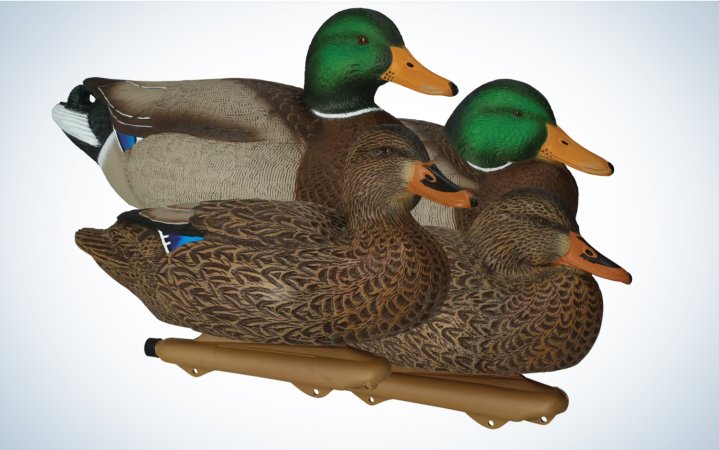
See It
Pros
- Affordable
- Durable
- Large size makes them visible
Key Features
- Vibrant paint job
- Weighted keel with multiple attachment points
- Two body positions
- Flexible EVA blend body
- $59.99 for six
If you want to kill ducks consistently, don’t hunt with cheap decoys. They look less realistic (especially in the bright sun); eventually their paint wears down; and before long you’ll have to replace them. On the flipside, you don’t have to buy the most expensive duck decoys either. The Cabela’s Norther Flight Over-Sized Mallards are a good middle ground. They look real enough, if you take care of them. They’ll last many seasons, and they are affordable. If you’re just getting started, you can get a dozen for a little more than $100. Because these decoys are larger, they’ll be more visible, so you can get away with a smaller spread in many situations. Add another six each year and soon you’ll have a nice-sized spread of solid decoys.
Best for the Money (Divers): Higdon Standard Bufflehead
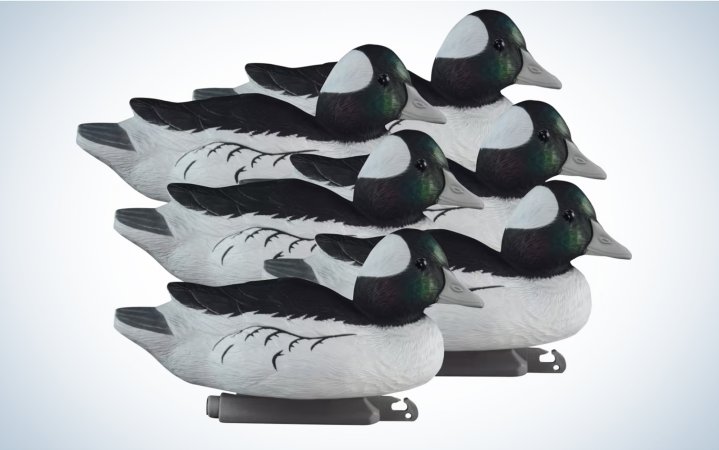
See It
Pros
- Affordable
- Highly durable
- Lightweight
- Nice colors
Cons
- Average realism
- Relatively small
Key Features
- Foam-filled option
- Weighted, short keel
- Six upright drakes
- $59.99 for six (foam filled)
Divers are typically not the wariest of ducks and they will come into a puddle duck spread. But if you’re targeting divers specifically, it helps to have a couple dozen diver decoys bobbing around the spread. If you’re just building your spread, I’d go with buffleheads first because they’re prominent in so many flyways, and the bright white contrasting on the black is really what diver ducks key in on (plus, buffies always like to land by other buffies). Higdon offers a foam filled option for these decoys, which I’d highly recommend. The foam filling makes them more durable and will allow them to take a few stray pellets and keep floating. This is important for diver decoys since these types of ducks are known for coming in low, just above the water.
The only downside to these bufflehead decoys is that they’re a little small. If that’s a problem for you, go with Higdon’s Standard Bluebills, Standard Ringnecks, or Standard Redheads. They’re all good. Hunting divers often calls for big spreads on big waters, so if you’re in a diver hot zone, I’d recommend getting a few of the Standard Diver packs, which includes redhead, bluebill, and ringneck species.
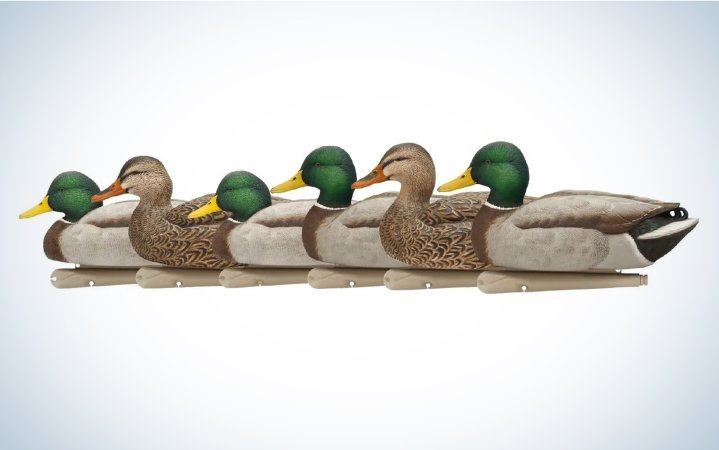
See It
Pros
- Most realistic wood duck decoy on the market
- Durable
- Large size makes them visible
- Great for choppy water and current
Cons
- Not very packable
- Poor mounting attachments on keel
Key Features
- Weight-forward swim keel
- Four drakes, two hens
- Two lifelike body positions
- $109.99 for six
This is a magnum mallard decoy at its finest. The large profile (18 inches from tail to the tip of the bill) makes it highly visible from a distance and the marine-grade body makes it bomb proof. The beefy, weighted keel ensures it will handle any chop. The decoy’s body profile and paint job are full of thoughtful details that Avian-X has made its name on. These decoys are ideal for migrating mallards on big waters. Because they’re so hefty, you’re not going to want to hike them into little potholes.
There are only two knocks on this decoy. First, the mounting spots on the keel are not complete holes. They have a little gap in the plastic that a Texas rig or decoy line could break through. The second is the price. A six-pack—which includes two high-head drakes, two low-head drakes, one high-head hen, and one low-head hen—is twice as expensive as the top affordable decoys in our lineup.
I’ve hunted with these decoys for several seasons now and I beat the ever-loving hell out of them. Unlike my buddy Gifford, I do not always keep my decoys in a slotted bag. They get bounced around in boats and truck beds and garage floors. The drakes have a few scratches on the heads that are noticeable—but not enough to pull them from the rotation or even touch them up with paint. The hens have no damage whatsoever.
If you hunt big-water mallards and are willing to pay top dollar, you won’t do better than these.
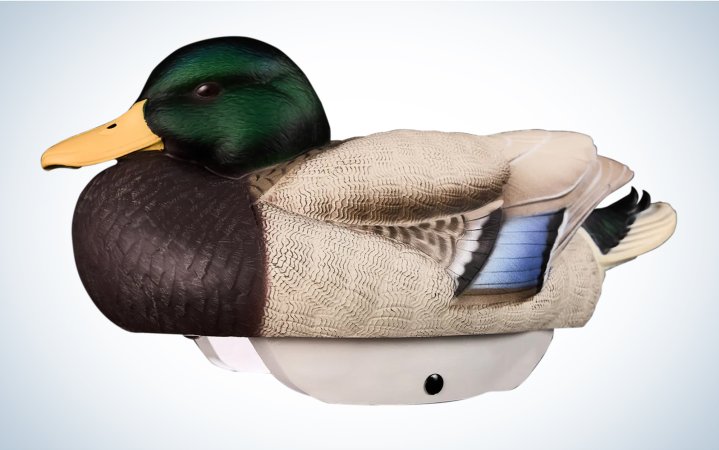
See It
Pros
- Ultra-lightweight
- Durable
- Excellent design for Texas rigging
- Excellent motion on the water
Key Features
- Made of closed cell EVA resin
- HollowCore body
- Dual-keel hull
- Four drakes, two hens
- Two lifelike body positions
- Self-righting keel weights for high wind and waves
- $149.99 for six
I got to see Heyday Outdoor’s Hydrofoam Decoys (formally known as Lifetime Decoys) in action while hunting with the Heyday crew on an early teal hunt in Texas. The coolest thing about these decoys—and the reason they stand out from the competition—is the material itself. Instead of hollow plastic, they are made entirely of EVA foam, which is the same material Crocs are made from. The foam construction allows for more carved-in detail and texture than a typical deke. This combined with the intricate painting that goes into each model makes the Hydrofoam decoys look incredibly realistic on the water. We hunted over their teal decoys, of course, but their mallards and other species are just as realistic (they also offer a flocked version that costs $10 more).
Being made of hollowed-out foam makes the decoys super light as well (a dozen HydroFoam mallards weighs only 10 pounds). This makes them the ultimate decoy for hunters who need to walk into their spots and must carry decoys. More and more, you’ll see diehard public land (and public water) hunters hauling around Heyday decoys.
Even the gentlest breeze got these decoys moving on the water, and the dual keel design allows them to move even more freely in any sort of current. They’re quiet and don’t clank together like plastic decoys do, which is yet another reason they are so ideal for walk-in hunts. Their lightweight design doesn’t sacrifice durability, either. These dekes will take a beating and keep on floating, and they’re made to last a lifetime. —Dac Collins
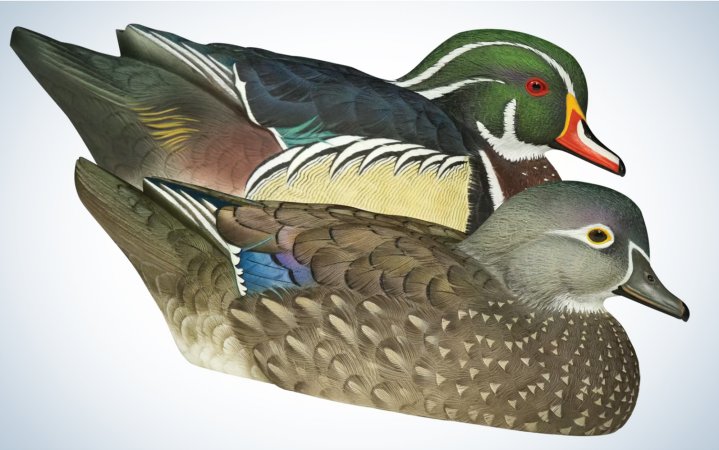
See It
Pros
- Most realistic wood duck decoy on the market
- Durable
- Large size makes them visible
- Hens look great too
Key Features
- Weight-forward swim keel
- Four drakes, two hens
- Two lifelike body positions
- $109.99 for six
Do you really need wood duck decoys? That all depends upon how seriously you target woodies. Singles and pairs will lock into a regular mallard spread. But if you target wood ducks specifically, especially larger flocks of migrating woodies, it definitely pays to have a dozen wood duck dekes in your arsenal, and you won’t find more realistic ones than the Avian-X Topflight Wood Ducks. First, you’ll notice the colors. They are gorgeous and vibrant, just like a real woodie. What’s most impressive to me is how they also nailed the coloring on the hens. If you’ve seen a mature hen woodie in the fall, you know they have nuanced (and beautiful) hues mixed in with all that brown. Avian-X nailed that with this series. Also, the body positions are very accurate and lifelike. A lot of other wood duck decoys have the drake’s head sticking high up above the water, like he’s on alert. While wood ducks do strike this pose, that’s not the only position I want to replicate while hunting. The Avian-X body positions look much more natural and relaxed.
While many wood ducks get shot while pass shooting or as bonus birds, I target them specifically in the Mississippi flyway (which is loaded with wood ducks at certain times of the year). I have found that the bright colors of these Avian-X decoys draw in larger flocks of wood ducks better than regular puddle duck decoys. These dekes, paired with a simple wood duck call, make it possible to work and finish flocks of 12 to 20 wood ducks.
Best Full Body Decoys: Avian-X AXP Full Body Mallards

See It
Pros
- Most realistic full bodies on the market
- Durable
- Large size makes them visible
- Move well in the breeze
Cons
- Wicked expensive
- Stakes can be hard to set on frozen ground
Key Features
- 17-inch field stake
- Four drakes, two hens
- Variety of body positions
- $199.99 for six
- Six-slot bag included
By now you’ve probably noticed that Avian-X keeps popping up on this list. That’s because they make extremely realistic decoys, and I’d rather hunt with fewer realistic decoys than more dekes that don’t look as good. That concept holds true for the Avian-X AXP Full Body Mallards.
These are large, full-body decoys that look amazing in the field. Their colors, detail, and body positions are all excellent. The only problem is that they’re very expensive. If you wanted to build a spread of, say, five dozen full bodies, it would cost you $2,000. But many hunters don’t need that many full body duck decoys. Most field hunters targeting mallards can get away with a goose spread along with a couple dozen full bodies on the X (along with some spinners). Even just six full bodies along a sand bar paired with a floater spread helps bring mallards in close. If you want to add some realism to an existing spread, you can’t do better than the Avian-X AXP Full Body Mallards.
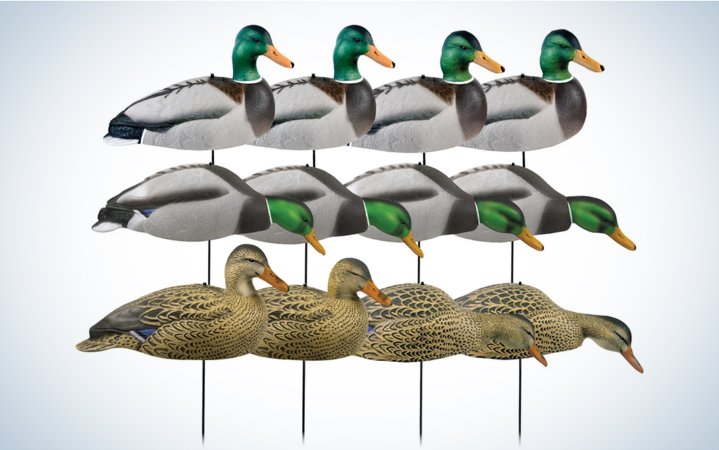
See It
Pros
- Light
- Don’t take up much space
- Affordable
- Move well in the breeze
Cons
- Less realistic than full bodies
- Stakes can be hard to set on frozen ground
- Too much movement in high winds
Key Features
- 12 field stakes
- Six drakes, four hens
- Two body positions
- $143.99 for 12
- Removeable heads makes them stackable
If you’re new to field hunting and set on starting a duck spread, these shells would be a good place to start. They cost less than half the price of the most expensive full bodies. And they look plenty good enough to kill ducks over. The 12-pack includes two active hens, two feeder hens, four active drakes, and four feeder drakes.
Also, because you can remove the heads on these shells, you can stack them. That means they will take up less space in a decoy bag and you’ll be able to load your spread into a truck instead of needing a trailer. The real downside here is that in high wind (often when the duck hunting can be very good) any type of shells on a stake will bob or spin frantically. Some movement in your spread is good. Too much, and unnatural, movement is not good.
The Best Motion Decoys
“Motion decoy” used to mean only motorized spinning-wing decoys known as robo ducks or, simply, Mojos. But now there’s a wide variety of motion decoys available. Here are three of my favorites. Read my full review of the best motion duck decoys here.
Best Spinning Wing Decoy: Mojo Mallard Drake
Mojo Outdoors 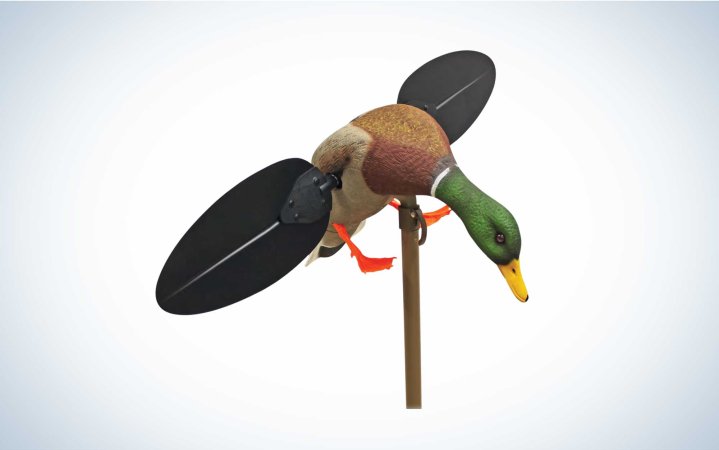
See It
Key Features
- Tested Run Time: 10 hours
- Weight: 5.52 pounds
- Super simple controls
- Remote controlled with intermittent and constant settings
- Aluminum wings
- Price: $200
Mojo is the OG of spinning wing decoys, and their latest product, called simply the Mojo Mallard Drake, is a bit of a throwback to those first robo ducks. The most notable thing about this spinner is the large profile of the aluminum wings. The Mojo decoy creates noticeably more flash than both other competitors in the market. I think that’s a good thing.
There are many times when I won’t run a spinning wing decoy, but when I do, I want maximum visibility, which the Mojo offers in spades. The upgraded motor spins those black and white wings quickly, creating a good amount of vibration in the unit. Interestingly, even with the vibration, I found the Mojo to be quieter than other spinning wing decoys.
I also like that the Mojo Mallard comes with a sturdy support pole, which I had no problem burying deep into frozen ground. Keeping with that theme of durability, the decoy has a wiring system that allows you to connect the battery directly to the motor if you’re having issues with the standard connection (which I never did).
The body of the decoy looks far more realistic than previous versions. However, I don’t think body realism matters all that much in this type of decoy. What draws birds in is the flashing/spinning motion. One nitpick is that the black paint on the wings is already starting to chip off after one season, but that’s nothing a coat of matte black spray paint can’t fix.
My only real critique of this decoy is that I think the angle of the body position is too dramatic, making the wing angle too steep. Mojo says this is an anatomically correct “steering” position of a landing mallard. But to my eye, when mallards flutter their wings before touching down, they are usually straight up and down (at least when close to the water). While hunting I solved this by angling the stake a little so that the wings were more parallel to the water. Did this have an impact on the ducks? I have no idea, but it made me feel better about how the decoy looked in the spread. I shot plenty of ducks over it too.
Best Rippling Decoy: Avian-X Power Shaker
Avian-X 
See It
Key Features
- Foam filled body
- 10-hour run time (advertised)
- Preening and feeding body postures
- Powered by four AA batteries
- Available in three species (mallard, pintail, black duck)
- Price: $80
I knew the Power Shaker decoys were effective when they faked out my veteran duck dog. The first time I hunted with them, I sent old Otie dog on a retrieve and she swam right toward the ripples being made by the decoy. After a few more productive hunts the Power Shakers became my new favorite decoys of the year. Now, I bring them on every water hunt.
The decoy has an internal motor that creates a rumbling vibration, which generates ripples in the water, similar to those that a live duck would make. Two to four of these shakers in a spread of two dozen decoys really does help add realism. They are especially useful on small waters during calm days. That subtle, but noticeable, ripple in the spread is sometimes all you need to get ducks to commit. I honestly believe that I killed ducks over these decoys that I wouldn’t have otherwise been able to coax into range.
The Power Shakers have a simple on/off switch and are fueled by four AA batteries. I wish they were rechargeable with an indicator showing how much battery life they had left, but alas, we live in an imperfect world. I now carry a couple extra AA batteries in my blind bag in case one of these shakers dies during a hunt.
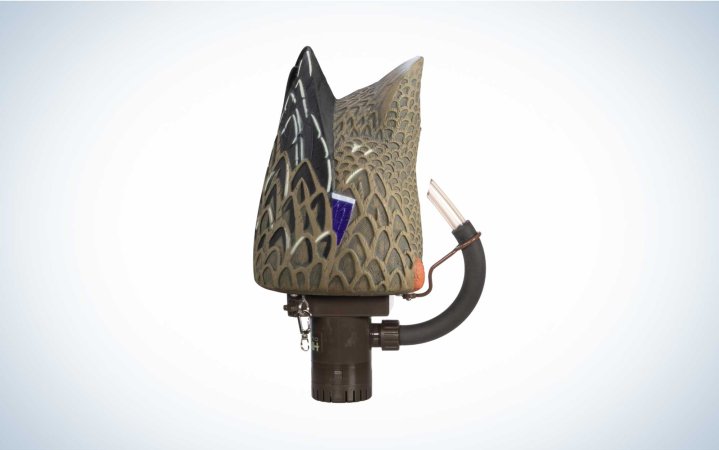
Higdon Outdoors
Key Features
- Foam filled body
- 7-hour run time (advertised)
- Can run in salt water
- Runs in 6 inches of water
- Price $130
The Higdon Pulsator has been out for many years, but the Pro model is by far the best version yet. Previous generations had external wires connecting the battery to the bilge pump and years ago there was a recall related to charging issues with these decoys.
But no more. The Pulsator Pro has no external wires. The charging port is magnetized and incredibly simple to use. The on/off switch has been upgraded to a hefty orange tab. All in all, the Pulsator is more durable and easier to use. It still creates that wonderful splashing action in the spread that mimics aggressive, feeding mallards.
This decoy is most effective in larger spreads, especially in the timber or on big water. During my hunts in 2024, I was impressed with how the pulsator was able to handle mucky water without ever bogging down. My only qualms were that a 7-hour run time is a bit short (compared to other motion decoys) and the on/off switch on my decoy got sticky several hunts in. I had to use the edge of my boat to force it to turn on.
FAQs
In my experience, fully flocked duck decoys are not worth it. I mostly hunt ducks over water and my decoys get covered in marsh muck on almost every outing. They get rained on and covered in snow and ice. They get bounced around the bottom of boats and in decoy bags. All of these conditions work to ruin flocking. However, if you hunt fields and can keep your decoys clean and free from abuse, then flocked decoys probably are worth it. Flocking eliminates glare, which is a killer on sunny days in the field.
The best rule for decoying is to set up your dekes just how you see real ducks sitting in a marsh or field. When you’re scouting, pay close attention to how and where the ducks are positioned. Are they all bunched together feeding? Are they spread out loafing? Are they separated in little family groups? Replicate this when you set up your spread. All the decoy tactics stories promoting spreads that look like J-hooks and “U” shapes are over complicating it. Replicate live birds the best you can and make sure you have a little landing zone (known as a kill hole) set about 20 yards out, right in front of the blind.
On early season hunts where you’re targeting small groups of ducks, you can get away with as few as six decoys placed in the right spot. If you’re hunting small water like a little pond or stream, six to a dozen is great. In general, if you scout diligently and are hunting on the X (where the birds want to be) you will need fewer decoys.
For many other hunting scenarios, two dozen to four dozen decoys will get the job done. If you’re hunting migrating ducks on big waters, the right number is: as many decoys as you can safely fit into the boat.
What Makes a Good Duck Decoy?
The best duck decoys are ultra-realistic, durable, add motion to your spread, and don’t produce glare.
Realism
The carve (shape and detail of the body) should look like a real duck. The paint scheme should also look realistic in a variety of light conditions. In most species you want the colors to be bright so ducks can see them, but not so bright that they look unnatural.
Durability
There are all kinds of online comments and videos about certain decoys surviving (or not surviving) a shotgun blast. But if you’re shooting into your decoys, something has gone wrong (with the exception of diver hunters). Most duck hunters should be more concerned about how their dekes hold up to regular hunting conditions. Will their paint chip when they’re bounced around in a boat? Will they crack in freezing conditions? How many seasons will they last?
Motion
Ducks move around, even when they’re loafing on the water. Good duck decoys will “swim” naturally with a breeze or in the current. Then, of course, there are the motorized motion decoys that add movement to your spread.
No-Glare
Glare off a decoy is a deal breaker. On a sunny day ducks will spot it from long distance and avoid your spread, because it doesn’t look natural. Just watch live ducks in full plumage during bluebird conditions. Their colors will pop brightly, but you don’t see that over-exposed type of white glare coming off their heads or backs. Cheap decoys typically have more issues with glare. Higher end dekes use paint that won’t glare.
Read Next: How to Decoy Ducks
Final Thoughts
Duck hunting is hard work, and it’s expensive. Add up the cost of the best duck hunting shotguns, the best duck hunting waders, and throw in shells and licenses; suddenly it seems like you should try to save money by buying cheap decoys. But that way madness lies. Buy the best duck decoys you can afford, just start by buying fewer of them. It might take you several years to build up a full spread, but that’s fine. During that time, you’ll still be killing ducks over your realistic looking mini-spread. Remember that good decoys are an investment. And if you give them just the smallest amount of care, they will last you many years of good hunting.
Read the full article here



